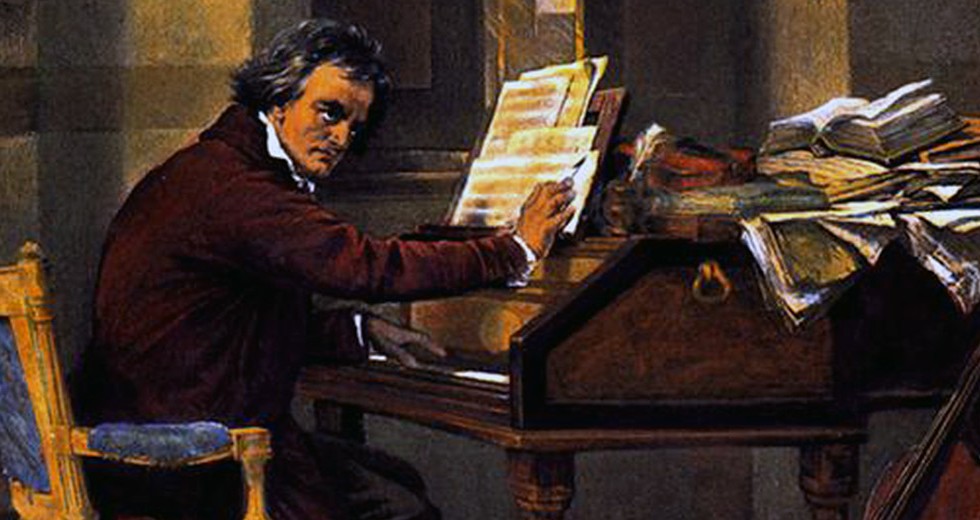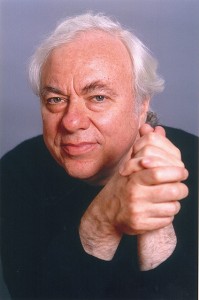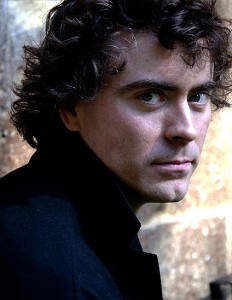
Richard Goode and Paul Lewis rank among the most insightful Beethoven interpreters of their generations. At age 70, Goode is revered as something of a living master, whose performances of the celebrated composer’s works are often placed alongside those of Wilhelm Kempff and Artur Schnabel. Lewis, now 41, is not quite in that league yet, but the English keyboardist is well on his way.
Each has produced era-defining, well-reviewed sets of Beethoven’s 32 piano sonatas, works which date from 1795 to 1822 and mark his extraordinary evolution as a composer and human being. Goode released his authoritative version in 1993, and Lewis’ set came out in four volumes during 2005-08, with the fourth winning prestigious Gramophone Awards for recording of the year and best instrumental recording.
More on Paul Lewis: Read Andrew Patner’s interview in the Sun-Times.
In advance of their appearances within a week each other with the Chicago Symphony Orchestra (Goode will perform Mozart’s Piano Concert No. 23 on April 24 and 26 and Lewis takes on Beethoven’s Piano Concerto No. 3 on May 1-3), we posed identical questions to each pianist about Beethoven and his timeless piano works. Here are their responses, edited for length and clarity:
You’ve performed a great deal of music by Beethoven. What draws you to this composer and keeps you coming back to his works?
 Goode: So many things, but a huge emotional range — every conceivable feeling from the tenderest lyricism to the most powerful kind of drama. For Beethoven, a sonata was kind of an adventure. There was nothing standardized about it. He was inventing it as he went along. And in a certain way, the piano sonatas are one of his most personal documents, because I think he tried things out for the piano and didn’t feel hemmed in by any particular requirement of length or form. So there is just an immense range. One of the reasons you can play the 32 sonatas is that there really are no two that are significantly alike.
Goode: So many things, but a huge emotional range — every conceivable feeling from the tenderest lyricism to the most powerful kind of drama. For Beethoven, a sonata was kind of an adventure. There was nothing standardized about it. He was inventing it as he went along. And in a certain way, the piano sonatas are one of his most personal documents, because I think he tried things out for the piano and didn’t feel hemmed in by any particular requirement of length or form. So there is just an immense range. One of the reasons you can play the 32 sonatas is that there really are no two that are significantly alike.
I’ve been playing recently mostly the later the sonatas — the last three and also the Op. 90 and Op. 101 — and those are particularly adventurous and also hold a certain mystery. The late ones still attract me most, because of the sense that one never gets to the bottom of their inspiration. Emotionally and spiritually, they remain somehow not completely fathomable. They keep leading you on. I give as an example my favorite, maybe because I played it last, the Op. 101 sonata, which is a very unusual piece for Beethoven, but Beethoven was always writing unusual pieces.
Also, one of the tremendous magnetic attractions of Beethoven is that he does give you the depths of tragedy. He does give you this sense that he has experienced and felt the deepest sorrow and deepest conflict, and at the same time, there is this extraordinary feeling of resolute power in his positive music. I think you feel that at the end of [Op.] 101 and you feel that throughout this music, this fantastic strength of someone who has gone through the deepest kind of sorrow and weathered it. So there is a tremendous comfort in his music. There’s also extraordinary simplicity. Some of his Beethoven’s hymnal music , for example, the last movement of Op. 109, the slow movement of the so-called Emperor Concerto or the Archduke Trio have a kind of elemental simplicity and strength that I think is very unusual.
Do you remember the first piece by Beethoven that you played?
You know, I don’t. I remember the first piece that somebody played for me. I remember that my very first music teacher, when I was 6 years old, attempted to play the Moonlight Sonata — the first movement. But I do remember somebody coming over to the house and playing on our upright piano the first movement of the Pathétique [Sonata]. I remember it, because it made a great impression on me. It was so powerful, but also because the lights flickered as he played. He played with such intensity that our floor lamp began [to vibrate].
How old do you think you were at the time?
I might have been 7. Something like that.
Who are some of your favorite keyboard interpreters of Beethoven, past or present? Have there been some who were especially inspiring?
Not that there haven’t been other Beethoven performances that have been extremely important to me, but I would say in very different ways, Artur Schnabel and Rudolf Serkin. I would say [with] Serkin, whom I heard many times, and of course, I studied with him, [he had] a kind of power and drama and ethical conviction that he brought to his Beethoven — a sense of absolute integrity and honesty and a hugeness of temperament. And with Schnabel, a kind of intellectual insight and a sense of shape, which carved the music out in such a way that it lasted for you. Those shapes were made so palpable and so almost sculptured in time in a way that I have found enormously important for me in thinking about music and in thinking about my teaching.
What has been the most surprising discovery about Beethoven’s music as you’ve gotten to know it better and better?
When you think how quickly music was propelled into a whole new set of possibilities with Beethoven, that’s the most surprising thing. The most surprising thing is that we’d go from the works of later Mozart and Haydn, who was maybe more of a precursor than Mozart in his certain unpredictability of form and invention, but then Beethoven writing a piece like Hammerklavier maybe 25 years after the death of Mozart, that’s extraordinary.
Was recording all of the Beethoven piano sonatas an important goal? What were some of the principal challenges of that mammoth project?
Learning them for one thing, because when I started doing it, I didn’t know them all of them. I had played some of them many times, others a few times and quite a few of them — particularly early ones — not at all. That was important. I did give myself a lot of time to learn them, to work on them and often to re-record them, because I had not recorded much before then and I found that recording was a time of trial and uncertainty — trying things out, being dissatisfied and trying again. Satisfying yourself as far as what the microphone gives back and what you realize you are doing and what you feel will perhaps stand the test of time is really what you want to do. A detail, which is really not very important and would pass by in a performance, suddenly becomes important in recording for better or worse. It becomes something that takes your attention and makes you dissatisfied.
How did you feel when it was done?
Relief. And I have to say that I have not heard then since. It’s a weakness of mine. I don’t go back, because I think maybe I won’t like it and then I will want to do it again. I have a feeling that I might want to re-record some of the sonatas, but at the moment, I have other recording plans.
Do you have a favorite among the piano sonatas? I think you answered that when you talked about the Op. 101.
It’s like the arbitrary choice. Certainly, there would be in every period some sonatas that I would favor, but again, the degree to which each sonata is an individual and each sonata is an aesthetically wonderful, worked-out whole, that’s extraordinary. If they’re all people, if they’re all characters, their fundamental features and the harmoniousness and logic of the personalities is amazing from Op. 2, from the beginning. That also strikes you when play the whole group.
Do you have a favorite Beethoven work that does not involve the piano?
Many. I would say almost any of this middle or late quartets. The Op. 127 has occupied a certain place the way the Op. 101 does in the [piano] sonatas. But the Missa Solemnis, particularly the last sequence, is perhaps the most moving thing I know in Beethoven.
How has your approach to Beethoven, especially his sonatas, changed over your career?
I can’t answer that. It’s changed only in the sense that I have changed slowly as a musician and certain things become clearer to me, perhaps the relation between the whole and the detail is maybe one way of thinking about it. But I’m not sure my relation to Beethoven has changed. In one aspect, thinking about and teaching certain pieces, the Hammerklavier is a piece that has changed in my mind. When I first worked on it many years ago with Serkin, I remember thinking that Beethoven’s metronome markings were very, very important to a true understanding of the piece, and now I feel differently. My whole sense of the opening movement is much less governed by the excessive speed of those metronome markings and the sense of having to achieve intensity by speed. Maybe that is some aspect of my slowing down as I get older, but it does seem to me that the richness of that first movement necessitates a much less crazy, fast tempo. But as far as a general feeling, I don’t know.
 You’ve performed a great deal of music by Beethoven. What draws you to this composer and keeps you coming back to his works?
You’ve performed a great deal of music by Beethoven. What draws you to this composer and keeps you coming back to his works?
I love the music instinctively. That’s the first thing. One of the things that keeps me coming back is just the fact that I never feel that I’m done with it. You never arrive anywhere with it. You’re just at a different point on the journey. And every time you come back to a piece that you’ve played for years and think you know, you see so many new things. You see things you thought you knew in a different light and [you] discover things for the first time as well. It’s just a never-ending process with this kind of music.
Do you remember the first piece by Beethoven that you played?
I do. It was the F Major Sonata, Op. 10, No. 2. I played it when I was 12. Well, it was far too difficult for me, and still is, by the way. I remember the last movement was completely unplayable. The warmth of the middle movement, the second movement, and the humorous character of the first movement and the surprises within it really struck me. I was so taken with that. I felt then that Beethoven was a composer I would want to spend some time with.
Who are some of your favorite keyboard interpreters of Beethoven, past or present? Have there been some who were especially inspiring?
I did listen a lot to my eventual teacher, not that I knew that I was going to have any contact with Alfred Brendel when I was 8 years old. But there was a record library around the corner that was very well-stocked, and they had all his records there, so I listened a lot to his Beethoven when I was young. Wilhelm Kempff was another pianist who I listen to still quite a lot and admire so many things about his playing. These days, pianists like Richard Goode and Emanuel Ax, I admire hugely what they do.
What has been the most surprising discovery about Beethoven’s music as you’ve gotten to know it better and better?
The answers that he seems to have. There is such a sense of struggle within his music. Especially in the middle period, you get this incredible turbulence and struggling with fate. You feel there are huge questions. He always seems to answer them. There’s almost a superhuman quality about Beethoven. And yet, it seems inevitable and natural at the same time. It’s that striving for something beyond that which we can normally access, which his music seems represent. The inevitability with which he seems to achieve that is one of the most astonishing things for me.
Was recording all of the Beethoven piano sonatas an important goal? What were some of the principal challenges of that mammoth project?
Originally we just planned the concerts over the two seasons, and when Harmonia Mundi came on board and said they wanted to record the cycle, it was a great bonus. That was a surprise. I wasn’t expecting to be able to record the whole cycle. It was a great opportunity to do it, and it was also a very important part of the learning process. I find that you learn in the concert hall. You can practice and practice until you are blue in the face, but there are certain things that you realize about whatever you’re playing when you’re in that concert situation, and the energy that an audience gives a performance is crucial to the experience. The recording process – I think you can say something similar about that. When you’re trying to achieve a certain level of detail that you maybe can’t always [achieve] in a concert hall so easily, to go back and listen and try again, to try something different, it’s also a great part of that learning process. So, yes, I felt that I learned many things during those studio sessions.
How did you feel when it was finished?
Strangely enough, I never felt that it was done. I only feel that I want to go and do it again at some point and do things differently. That’s the danger when you continue to work at these pieces. It’s a very fluid process. It’s always in a state of change. For that reason, I make a point of not listening to my recordings even out of curiosity to see what I did eight years ago or something. It’s always unfinished business, so I never got a sense of getting to the top of the mountain or coming down the other side at the end of that project.
Do you have a favorite among the piano sonatas? Do you have a favorite Beethoven work that does not involve the piano?
I have many favorites. In terms of the piano sonatas, favorite piano sonata to play and favorite piano sonata to listen to are not necessarily the same. I get a great thrill out listening to the Hammerklavier Sonata, but in terms of playing it, I do enjoy playing it and I enjoy the challenge, but I just don’t know another piece of music by Beethoven or any other composer, for that matter, which reaches that level of difficulty. It’s difficult in every conceivable direction. So, for that reason, I wouldn’t say that it is a favorite to play. A favorite to play? The Appassionata [Sonata] is a great one to play because it feels relatively comfortable to the fingers, and it has such strong character, and it’s a wonderful piece, and it’s great to sink your fingers into it.
In terms of Beethoven that doesn’t involve the piano, I wouldn’t know where to start, really. Just for nostalgic reasons, I was 8 years old and [at] that record library I was talking about, I got out a record of the Fourth Symphony, and the point at which the slow introduction to the first movement goes into the main allegro section, and you get these repeated dominant seventh chords, hearing that for the first time just gave me goosebumps all over. I’ve always had a special soft spot for the Fourth Symphony. When we were expecting our first child, my wife had gone into pre-labor, and for some reason, we found ourselves sitting in the living room, listening to the slow movement of Beethoven’s Fourth Symphony. There is an extra element of strange nostalgia there.
How has your approach to Beethoven, especially his sonatas, changed over your career?
It’s difficult to put your finger on exactly what it is. You look back and you realize that certain things have changed when you look back 10 years or so. But when you are in the middle of it, it’s difficult to know exactly what it is that is changing and why. How can I answer that question exactly? What I’m looking for is a particular balance. When you think of Beethoven, we have this stereotypical image of Beethoven the great unwashed — the outspoken, boisterous character. There’s a lot of that in his music. His music is among the most uncompromising music that I know. But I think it’s important not to focus too much of what is immediately apparent but to find also the tenderness. There’s a great tenderness in Beethoven. He’s such a many-sided composer. It’s looking for that balance, and that balance now is different from the way it was 10, 15 years ago, and I guess it will different in another 10 or 15 years down the line.
Kyle MacMillan, former classical music critic of the Denver Post, is a Chicago-based freelance writer.
PHOTO: Detail of a painting by Carl Bernard Schloesser of Ludwig van Beethoven in his study.
VIDEO: Paul Lewis discusses Beethoven, via YouTube.